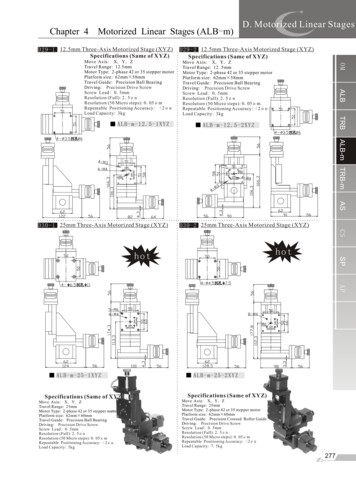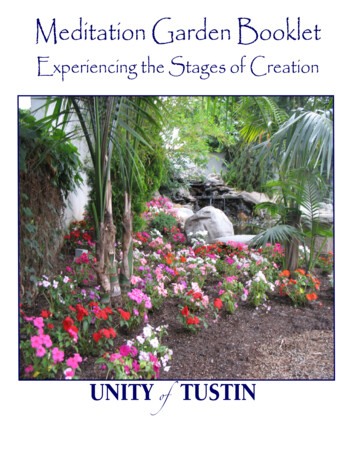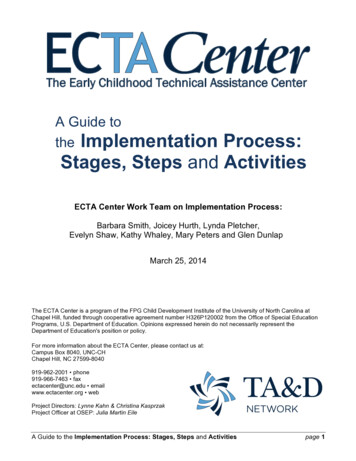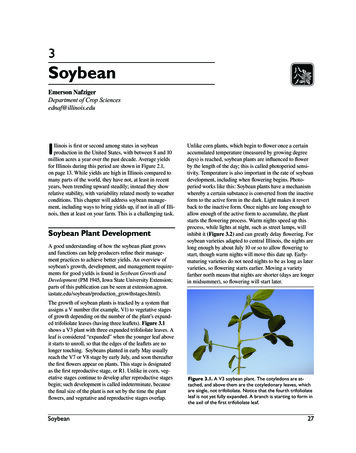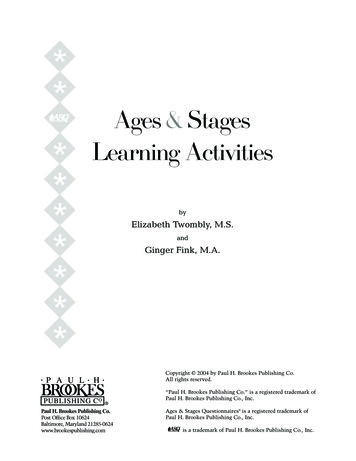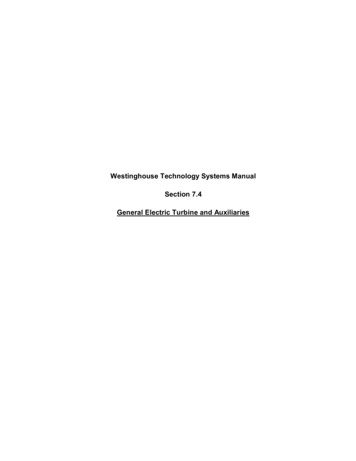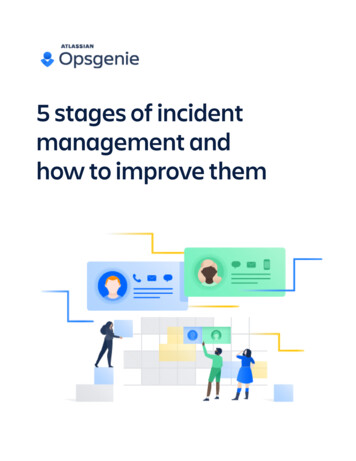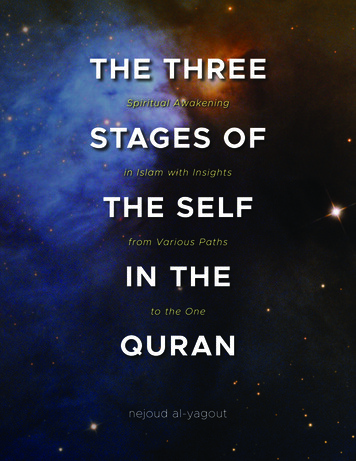
Transcription
THE THREESpiritual AwakeningSTAGES OFin Islam with InsightsTHE SELFfrom Various PathsIN THEto the OneQURANnejoud al-yagoutDownloaded from https://www.holybooks.com
ار م ار م In the name of God, the Compassionate, the Merciful*Downloaded from https://www.holybooks.com
The Three Stages of the Self in the Quran:Spiritual Awakening in Islam with Insights from Various Paths to the Onenejoud al-yagout2Downloaded from https://www.holybooks.com
Quotes from M h dd n Ibn A ab The Se en Daf he Hea : P a e f he Nigh and Dafthe Week, translated by Pablo Beneito and Stephen Hirtenstein, used with permission by StephenHirtenstein/Anqa Publishing; Quotes from S ami Si ananda s Bhagavad Gita translation used withpermission from https://hol books.com; Quote from J.P. Vas ani s Many Scriptures One Wisdom:Treasures from the Sacred Texts used with permission from Hay House India; Quotes from Dadi Janki sCompanion of God used with permission from BK Publications; Quotes from ParamahansaYogananda s Journey to Self-Realization: Collected Talks on Realizing God in Daily Life used withpermission from Self-Realization Fellowship; Quote from Jeffre Moses Oneness: Great PrinciplesShared by All Religions used with permission from Random House; Quotes from Shaykh Abd al-Qadiral-Jilani s Sublime Gems used with permission from Zahra Publications; Quote from Reverend StevenGreenebaum s The Interfaith Alternative: Embracing Spiritual Diversity used with permission fromNe Societ Publishers; Quote from Rahim Sno s Remember Who You Are: 28 Spiritual Verses fromthe Holy Quran used ith permission from Rahim Sno ; Quote from Karen Armstrong s The SpiralStaircase used with permission from Random House.If you want to obtain permission to use quotes or excerpts from this book (excluding the quotes/excerptsfrom the publications above for which you need to contact the author/publisher of each publicationdirectly), you can get in touch with Nejoud at theinterheartinitiative@gmail.com or through the contactpage of The Interheart Initiative website (see below). Permission from Nejoud is also required to printphysical copies of the book for distribution. Only the PDF file itself in its entirety can be sharedfreely with others or on websites with no permission from the author for non-commercial purposes only.This book is not permitted for sale in any format PDF, print, audio, or otherwise under anycircumstance whatsoever.The information in the book is not intended to substitute for professional medical or mental healthadvice. Consult with a medical expert if you are struggling in any way. Some practices in this book maynot be suitable for you, so kindly use divine discernment when it comes to your spiritual path, as it isyours alone to take.Stay blessed. The Three Stages of the Self in the Quran, Nejoud Al-Yagout, 2020 The Interheart Initiative m3Downloaded from https://www.holybooks.com
This book is dedicated to Al Wahid (The One)4Downloaded from https://www.holybooks.com
ContentsThe Opening9Dear Reader10An Introductory Note11Stage One12The Lower Self14Attachment to the Ego15The Collective Manifestation of the Ego16Desire17Scripture: A Spiritual Mirror18God s Oneness and E pansi eness19The Path of the People20Worshippers of the One21The Trust22The Testimony of Yes23Al Ghafoor (The Forgiving)24Love on The Way25Stage One: Pause and Ponder26Divine Supplications of the Heart for Stage One30Stage Two31The Self-Incriminating Ego33Fear and Awakening35The Voice of Blame Within365Downloaded from https://www.holybooks.com
Al Jihad Al Nafs: The Inner Struggle37Are We Awakening?39We Are the Other40A Divine Invitation to Unity41Surrender to the One43Why Diversity?44We Belong to the One45Does Evil Exist?46Social Activism48Where Is the Darkness?49The Esoteric Essence of Acts of Worship50In the Direction of Higher Love52Remedies in our Scriptures53The Ninety-Nine Names/Attributes of the One54Guidance and Striving60The Invitation61Forgiveness on the Path of Awakening62The Surrender of I63Stage Two: Pause and Ponder64Divine Supplications of the Heart for Stage Two65Stage Three66The Garden of God68About the Author696Downloaded from https://www.holybooks.com
Acknowledgments70References71Endnotes737Downloaded from https://www.holybooks.com
O m God, You are the Trul Existent, while I am the fundamentally non-e istent.1Ibn Arabi8Downloaded from https://www.holybooks.com
The OpeningIn the name of God, the [Compassionate], the [Merciful*]All praise is due to God, Lord of the [Worlds];The [Compassionate], The [Merciful*][Owner] of the Day of Judgment.You alone we worship, and to You alone we turn for help.Guide us to the straight path: the path of those You have blessed;not of those who have incurred Your wrath,nor of those who ha e gone astra .(Quran 1:1-7)9Downloaded from https://www.holybooks.com
Dear Reader,This is not the work of a scholar nor a researcher, nor an awakened self, but the words ofone who is a work in progress under construction, so to speak.In this book, all are welcome to bask in the universality of God s omnipresence, for Hissignature is everywhere. There is room on earth for a butterfly and a rhinoceros, a fireflyand a gazelle, a bee and an elephant, a tiger and a pangolin, a peacock and a fly, a gooseand a silverback gorilla, a zebra and a hippopotamus. There is room for an oyster and adolphin, a whale and a crab, a starfish and a shark. There is room for a moon and a shootingstar, a planet and a black hole, a lotus flower and a palm tree, a galaxy and an asteroid, ashore and a rainforest, a desert and a tree, a savannah and a mountaintop, a pebble and agemstone, a valley and a horizon. There is room for a peasant and a tradesman, a merchantand a janitor, a sweeper and a ruler, a beggar and an executive. There is room for a Hindu,a Jew, a Muslim, a Christian, a Sikh, a Baha i, a Jain, a Buddhist, a pagan, an atheist, anagnostic, a con ert, a spiritual but not religious. There is room for a rabbi, a pastor, apriest, an imam, a guru, a monk, a mystic, a singer, a writer, a poet, a rebel, a heretic. Thereis room for you and me.For the Divine encompasses all.Though the research in the following pages stems from the wisdom in the Quran, itdovetails with the wisdom found in all sacred scriptures and the wisdom inherent in allelevated souls. Reality is singular, but the ways of waltzing with the One Reality are plural.Whatever our religion, whatever our inclinations, everything radiates with the signature ofthe One whether He is called Allah, God, HaShem, Brahman, or any other name in anylanguage.If any words in this book uplift you, praise the One. This is but the presentation of a vessel.Love and blessings to all,Nejoud10Downloaded from https://www.holybooks.com
An Introductory NoteThe Noble Quran mentions three types of the nafs, or self al nafs al ammara bil su (theself/ego that literally commands or inclines us to wrongdoing/sin/evil), al nafs al lawwama(the self/ego that literally blames itself), and al naf al m ma inna (the self which is atpeace), which will be referred to respectively as the lower self (or ego), the selfincriminating ego, and the self which is at peace. This book expands on the abovementioned notions of the self by offering the addition of the concept of stages of the selfand discusses spiritual awakening in the Noble Quran and in various sacred scriptures withinsights from souls across the globe.Although the three sections of the book refer to each nafs in a linear fashion, the chapterswithin each section and even the sections, for that matter do not have to be read in theorder in which they appear. Consider both the chapters and sections and everything inbetween as arisings.The Creator is referred to as God within this book except in the case of Arabictransliteration. All quotes from the Noble Quran are from the Wahiduddin Khan Englishtranslation or paraphrased from the translation in question.In Islam, God has ninety-nine names to describe His attributes. Some of the ninety-nineattributes are not mentioned directly, or in the exact manner they are presented, in the NobleQuran; other attributes are in the Noble Quran but missing from the list. God cannot beconfined to these particular ninety-nine attributes. And the names are not confined to onefaith. Our God is One. Any attribute in italics followed by an asterisk indicates one of thesenames taken from Da id B. Burrell and Na ih Daher s English translation of Abu HamidAl Gha ali s The Ninety-Nine Beautiful Names of God (published by the Islamic TextsSociety). Only the parts in parentheses are from Al Ghazali; there may be changes inspelling within the transliteration of the attributes. If there is no asterisk, and the attributeis not italicized, then the translation of the attribute is taken from Wahiduddin Khan sEnglish translation of the Quran. The case of italics without an asterisk indicates that thetranslation is neither taken from Burrell/Daher or Khan s translations but garnered (orparaphrased) from general translations or a personal understanding of the attribute inquestion.11Downloaded from https://www.holybooks.com
Stage One: The Stage of Al Nafs Al Ammara Bil Su(The Lower Self)12Downloaded from https://www.holybooks.com
Our Lord, e ha e ronged our [selves]: if You do not forgive us and have mercy on us,we shall be among the lost.(Quran 7:23)13Downloaded from https://www.holybooks.com
The Lower SelfIn the Quran, the lower self is that which incites us to evil, and this nafs is revealed in anapt verse in the Noble Quran:I am not tr ing to absol e m self:for [the self] incitesto evilunless my Lord bestows His mercy:Indeed, m Lord is forgi ing, most merciful.(Quran 12:53)These are words uttered by Prophet Joseph s master s ife. We learn in the Noble Quranthat she attempted to seduce Joseph (Quran 12:23). News of the incident found its wayoutside the walls of her home and the women of the city began to gossip about her, so sheinvited them to a feast and provided a knife for each woman to use to cut fruits. When shecalled for Prophet Joseph, the women were distracted by his beauty and cut their hands inabsent-mindedness, exclaiming: God preserve us! This is no human being but a nobleangel! (Quran 12:31).Such as Prophet Joseph s handsomeness that the omen ho condemned his master swife joined forces with her in tempting him. Prophet Joseph tells God that he prefer[s]prison to what these women are inviting [him] to do (Quran 12:33) and tells God that ifHe does not protect him from their guile, [he] ma ield to them and so become of theignorant (Ibid).Prophet Joseph sought refuge in God, knowing he would not be able to resist temptationby himself. He preferred a life confined to a cell to a life in which he would be subjectedto temptation. A stor to ponder14Downloaded from https://www.holybooks.com
Attachment to the EgoMostly, we are not aware of our attachment to the self. It is only via divine guidance thatwe are able, through Al Qadir (The One who is able), to ascend from the quagmire ofunconsciousness.In the lowest levels of this stage, we are attached to the material and physical world, ourdesires, and our inner inclinations.We ascribe to an ideolog of ma and reject those of other faiths, seeing onl ourdifferences. In spiritual blindness, we create unjust legal and political systems, until it isno longer our individual lower self that is inclined toward wrongdoing but myriad selves.Once we take the first step of surrender, Al Hadi (The Guide*) will lead the way. God helpsus climb the ladder of a akening, for God s guidance is the onl guidance (Quran 6:71).It is a steep climb, but when, as advised in the Bhagavad Gita, we let go of desire 2 and areliberated from the idea of mine and the ego 3, the path of guidance opens to us.15Downloaded from https://www.holybooks.com
The Collective Manifestation of the EgoWhen we ponder the state of the world, it is apparent that plenty of us on this planet areslaves of the ego. This is collectively manifested in human trafficking, an erroneous systemof wealth distribution, imperialism, capitalism, greed, dishonesty, self-obsession,dictatorship, the use of intoxicants, gambling, burglary, vandalism, abuse, falseimprisonment, rape, drug dealing, racism, xenophobia, nationalism, objectification of menand women, materialism, consumerism, and distractions and perversions which permeatethe mainstream. It is not happening out there. It is part of our collective (un)consciousness.In order to collectively elevate the world, we are invited to elevate the individual ego withineach of us. As a result, this transformation extends to how we interact with our families,communities, societies, nations, and the world. We hear of it: a shift in consciousness, anawakening, a global ascension. Many scriptures refer to a new earth. This new earth isreserved for those of us who seek or recognize the Divine Reality.In the meantime, what arises when we remember [our] Lord within [ourselves] (Quran7:205) is a world in which duality no longer affects us or causes us turmoil, for there is anintimate understanding, a heavenly grasping that what is, merely is. First, we become awarethat it is our lower self which creates drama and pain. It is our lower self, in forgetfulnessof its divine essence, that suffers in this paradigm of the yin and the yang.God explains in the Noble Quran that in the heavens and earth, all from Him, are signsfor those who reflect (Quran 45:13) and we are even invited to reflect within our veryselves (Quran 30:8). According to the Dhammapada, the Buddhist scriptures,contemplation frees us from passion, the lower self and ignorance.4 Thus, away from ourdistractions, let us ponder, let us contemplate, so we can rise from the shackles of theego.And in all our reveries, all our contemplations, let our mind (re)turn to our Creator.16Downloaded from https://www.holybooks.com
DesireWhen the devil was banished from paradise, he said he would wait for us on the straightpath of God (Quran 7:16). He waits not on the crooked path, but the straight path to theDivine. So, even when we walk the spiritual path, we cannot become complacent, for thereis inner work to be attended to, and vigilance is required on the way home.On the path to the One, our desire for anything other than God points to a hellish reality,while our yearning to know God leads us to a heavenly paradigm. In fact, if we eachresisted desire, paradise would be our shelter (Quran 79:40-41).Yet we cling to our obsessions, we remain hypnotized by the lower self. Even while weacknowledge the reality of God through acts of worship, we find it hard to let go of ourattachments or addictions.And what does Al Quddoos (The Holy*) say regarding those who are slaves to desires inthe Noble Quran?[C]onsider the one who has taken his own desire as a deity, whom God allows to stray in theface of knowledge, sealing his ears and heart and covering his eyes who can guide such aperson after God ? (Quran 45:23)This verse exemplifies the effects of our inclinations. Whatever we are drawn to from alower level of consciousness translates into spiritual blindness and spiritual deafness inwhich the divine realm is no longer a possibility.17Downloaded from https://www.holybooks.com
Scripture: A Spiritual MirrorWhatever our path and wherever our spiritual journey leads us, scripture is our very ownspiritual mirror. It can reflect back to us where we are on our spiritual journey, and it isfilled with signposts for attaining purification. In the Noble Quran, e are told that Godguides to the ways of peace all ho seek His pleasure, bringing them from darkness outinto light, b His ill, and guiding them to a straight path (Quran 5:16).God showers His grace upon seekers, those who yearn, the elevated, those of us who areripe for awakening. If we have not experienced awakening, it is because there are parts ofus that are not ready; or, in extreme cases, there are aspects of our being that reject thedivine altogether.As we look into the mirror of scripture, our discernment sharpens. And we find ourselvesshifting, ever shifting into the scope of possibility.18Downloaded from https://www.holybooks.com
God Oneneand E pan i eneThe first half of the most essential pillar in Islam is the shahadah, or testimony, La ilahailla Allah. Or: We bear witness that there is no deity except God. In Arabic, the phrase issimply No deity except God. The phrase there is in the translation of the testimon isredundant. God simply is. And there is no other. Uttering the name God with convictioncan reestablish our connection with Him: God. God. God.The shahadah is a declaration of the oneness of God; it testifies that anything in this worldthat we are consumed by or obsessed with cannot be the truth. It is a straightforwarddeclaration and is the turning point of our awakening. When we surrender all objects ofworship other than God and focus on the Divine alone, we forsake even the self and alignourselves with the will of Al Ahad (The Only). When we unite in this testimony, there is noplace for My God is not the same as your God, or My religion is the only way to God. In alow level of consciousness, we focus on theological differences. We see separation. But allof the sacred texts, all of the poems of the mystics, all of the messages of the sages arepointing toward the Divine, albeit from different angles.When we accept the diverse paths to God, we live in a state of acceptance. We do not haveto partake in rituals that contradict the teachings of our respective faiths, but we respectthat each community has its own dance. We also ensure we do not impose our way onothers.In any case, we cannot limit God to one book or one path. God s ways are inclusive.And so, we declare la ilaha illa Allah to say la, or no, to anything that takes us away fromthe One. We say yes to that which alone is: God.19Downloaded from https://www.holybooks.com
The Path of the PeopleMae remember God s ords in the Noble Quran:“If you obey the majority of those on earth, they will lead you astray from God s way. Theyfollow nothing but conjecture ” (Quran 6:116)This verse alerts us to the fact that being a part of the majority does not indicate we are onthe right path. The verse is also humbling. It reminds us that, in many cases, we have noknowledge of that which we speak of. We interpret the world based on our limitedconditioning and through the filter of the ego. In this way, we are led astray, and we leadothers astray. Sometimes, as we read words of scripture, a means of grasping the essenceof divine language is to ask God the meaning and wait for an answer in silence. Whatcomes up for us? What do we grasp beyond conjecture? God speaks to us through theverses, but we have to get out of the way to fathom the beauty of what is presented to us.Instead, we turn to everyone else for affirmation and imbibe trends to remain relevant. Inthe Hol Bible, e are told: [T]hat hich is highl esteemed among men is abominationin the sight of God. 5 We esteem wealth; we esteem adulation; we esteem prestige. Whenwe esteem Al M a ali (The Exalted*), however, we rise above the trappings of the worldand the ego. We rise above the need to impress; we rise above the need to follow others.We get back in touch with the part of us that is able to detach by reconnecting to Sourcethrough meditation, prayer, and witnessing the flowering of our hearts.When this love begins to blossom within us, it naturally extends to others. The more weare attuned to the fountain of unconditional love that is available to us, the more we canlead ourselves and others back to the path of God. Once on the path, we would not exchangeit for all the wealth and vanities in the world.As we evolve in consciousness, we know that what is given to us, in terms of materialobjects, can be taken from us at any moment. And so, we are asked to find j in G dgrace and mercy, which is far better than what [we] gather (Quran 10:58). In meditation,silence, and prayer, we attain realization that God s gifts of peace and love are eternal.20Downloaded from https://www.holybooks.com
Worshippers of the OneIt is ritten in the Noble Quran that [t]he[worshippers] of the [Merciful*] are thosewho walk upon the earth with humility and when they are addressed by the ignorant ones,their response is, Peace (Quran 25:63). We can carry this verse with us when we areinsulted or when we are in conflict with others.In this state of peace, we are no longer pulled into negativity: neither that of others nor thatwhich we hold inside us. We surrender negativity to God. We remain calm in the face ofantagonism. The more we set an intention to forsake arguments and retaliation, the morepeaceful we become. Dadi Janki, an inspiring spiritual teacher, invites us to remember thatour primordial nature is peace. 6 When we reply with the word Peace, we are affirming whowe are. When we invite peace into our encounters, however stressful they may be, we areable to recognize the peace in others (and in ourselves) beneath their (and our) anger.A good practice for shifting away from defensiveness is to recall how often we haveinsulted others. We often speak of karma, forgetting it affects us as well. When weacknowledge the pain that we, ourselves, have inflicted upon others, it is a gift. It creates avortex of repentance and compassion which, in unison, serve to raise our frequency.Feeling the pain of another reminds us how similar we are. Instead of hurting others, wecarry peace with us wherever we go. If we slip up and argue back, or if we instigate anargument, we make a resolve to try again. Giving up on peace is not for the ambassadorsof Al Salam (The Source of Peace).Another aspect to take into consideration is that when we argue with someone, we are notstooping down to their level. Our reaction or response indicates that we are on their level,and that they are on ours. Nobody out there brings us into their negativity: We meet onthe same level of our mutual negativity, each one bringing a trigger for the other to resolve.Sometimes, it takes a tense encounter with another for our buried resentments to surface.What we do with such an encounter speaks volumes about our resolve to awaken. It isessential that we are not tricked by the ego. The more we defend ourselves and blameothers, the more we forsake opportunities to rise above our ego.If we respond peacefully the next time, it does not mean we are peaceful. We may just begood at hiding our anger sometimes to anger the person even more, other times becausee ant to build a reputation as a peaceful person. In such a situation, e can in estigatewhere the false sense of peace is coming from in order to connect with the true peace thatresides within us.21Downloaded from https://www.holybooks.com
The TrustIn the Noble Quran, God states that He offered the Trust to the heavens and the earth andthe mountains, but they refused to [undertake] it [in fear] (Quran 33:72), and mankind[undertook] it (Ibid) because he is unjust and ignorant (Ibid).We were not ready to be caretakers; but, in our state of ignorance, we jumped at the chanceto prove we were worthy of the task at hand. This is why we are suffering, and the worldwe see is a manifestation of our ignorance.Indeed, [c]orruption has [manifested] on land and sea because of[ hat man s handsha e earned] (Quran 30:41). The good news is that we can raise our frequency; we canascend from our ignorance. This is what our scriptures have been inviting us to do for eons.The trust is there for each of us, regardless of where we are from, what path we are on, andwho we are (or think we are). When we uphold the trust, we keep our covenant to Al Khaliq(The Creator*). We take care of the environment and our communities. We give of ourealth to our parents,relati es, orphans, the needy, and [the traveler] (Quran 2:215).We provide hospitality to visitors from all nations. Refugees and immigrants fall under thecategory of travelers. We welcome them as part of our extended human family.When each of our individual hearts is aligned to the One, we are inspired by the Divine toalleviate sorrow in our world. He guides us to create a balanced earth in which eachmember is a divine relative of the other. Al Basit (He who expands*) stretches our love ineach moment. In this expansion, we evolve from lovers of sects, tribes, belief systems,nationalities, and ethnicities, to lo ers of the One ho lo es. As a result, e lo e God screation and begin to uphold the trust.In this millisecond, by transforming our egos, one at a time, we create a sustainable andinhabitable earth for us all. Skies clear. We say goodbye to zoos and cages andslaughterhouses and circuses. Borders dissolve; walls break down; poverty vanishes. Ah!Can we see it? It is not a pipe dream, but a possibility. Until then, how much longer willwe continue to hurt earth, its inhabitants, and each other?If people abuse our property or are ungrateful to us or ignore us, we leave them. And yetGod, in His compassion and mercy, remains with us. He can easily replace us with otherpeople (Quran 47:38), and yet He keeps us here. What a Friend is this!22Downloaded from https://www.holybooks.com
The Testimony of YesWe did not come here to eat, sleep, reproduce, indulge in desire, and then die. When Godcreated us, He asked the descendants of Adam: Am I not our Lord? (Quran 7:172).They responded in the affirmative, bearing witness (Ibid). The testimony was taken so wecannot say we were unaware of this on Resurrection day (Ibid).Even though we do not remember testifying, it is in our consciousness. We are here toawaken, to remember. The covenant is ever present in our hearts.The journey back to God is done alone. Even when we pray in a congregation, we areconnecting to God alone. We alone are responsible for our relationship to God lest [we]sa , Our forefathers associated others ith Godand we are only the descendants whocame after them Quran 7:173). God wants us to be independent. Religion and scripturemay guide us to Him, but what use are they when we continue to lean on the understandingof others? It becomes second-hand knowledge that is not experienced after a while. Godinvites us to wake up, and to do so we must take to the wilderness by ourselves without ourfathers and mothers and sisters and brothers and gurus and scholars. Here, we are able towitness for ourselves, firsthand, what has been pointed to by God and His divine vesselsthroughout the ages.23Downloaded from https://www.holybooks.com
Al Ghafoor (The Forgiving)Some of us might feel we have strayed too far to return to the straight path. God anticipatesour every thought and has an answer:[And] anyone who does evil or wrongs his own [self] and then asks God for forgiveness willfind God most forgiving and merciful. (Quran 4:110)This verse reminds us not to be hard on ourselves, for God is forgiving. The lower self isan unconscious part of us. When Al Noor, ([The] Light*) shines on it, the ego is able toalign with the divine.Here is a testament to the power of a good deed and the mercy of God:Whoever does a good deed will [have ten like it], but those who do a bad deed will [not havebut like it] and they shall not be wronged. (Quran 6:160)One good deed is equivalent to ten good deeds and one evil deed is worth one like it. Godis Al Rauf (The One who is kind) and His calculations are merciful. May we be inspired toappreciate the goodness of others (and ourselves) and not magnify their (or our) evil deeds.Purification of our thoughts is essential as well. The inner and outer are interconnected.Good deeds purify our thoughts, and good thoughts purify our actions. We do not have towait until our minds are pure to perform acts of service or worship, nor do we have to waituntil we have disciplined our minds to give to charity, pray, fast or awaken from the stuporof our ego.24Downloaded from https://www.holybooks.com
Love on The WayLove is a faithful companion on our spiritual path. Where is the love inside of us waitingto be resurrected?Al Hakam (The Judge) hides our sins from others, so who are we to expose the sins ofothers? We each have shadows within us that we would never want others to see.Sometimes the shadows are manifested on the outside through our actions, and other timeswe conceal them deep within us.God knows our hearts. He knows those of us who are pure and those of us who are impure.Judgment is His domain, not ours. What we can try to do, no matter how challenging, nomatter how many times we fail, is to keep trying to love, to bring love to every situation,whether inside of us or in the outer world. In this state of aiming toward love, there will nolonger be a part of us that claims to be loving. Even the attachment to the loving side ofour personalit can stall us on our journe of a akening. When e lo e for the sake ofAl Wadood (The Loving One), our ego cannot cling to the desire to appear or act loving toothers. We simply dissolve in our love for the One and become love.25Downloaded from https://www.holybooks.com
Stage One: Pause and PonderThe path of self-discovery is a blessed gift that brings us closer and closer to Al Wadood(The Loving One). As we navigate unknown terrain, we may struggle, but we turn (orreturn) to God s path. We also have a built-in moral compass, so we instinctively know thedivine remedies. However, our ability to rise above this stage depends on our willingnessto surrender the lower self. Below are a few questions to help us ascertain our spiritualstage.What about God?We can get close to God through scripture, through contemplation of His attributes, throughnature, through looking into each other s e es, or through meditation and pra er. But Godis beyond form. The more we think we know God, the more elusive His reality. I
In the Quran, the lower self is that which incites us to evil, and this . nafs. is revealed in an apt verse in the Noble Quran: ³I am not tring to absole mself: for [the self] incites to evil unless my Lord bestows His mercy: Indeed, m Lord is forgiing, most merciful. (Quran 12:53) These are words uttered by Prophet Josephs masters Zife.



